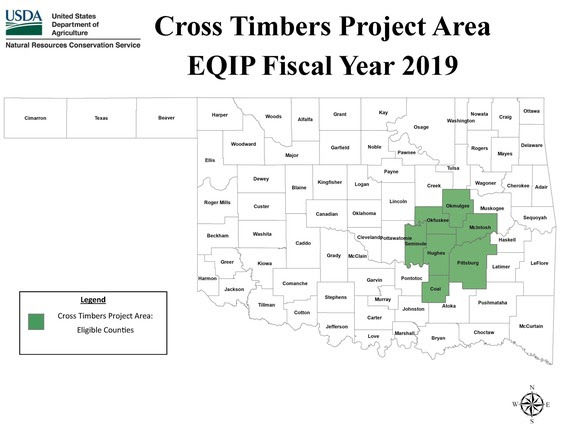Pheasants and Quail Forever encourages landowners to consider the Cross Timbers Initiative

EQIP deadline is Dec. 21
Pheasants and Quail Forever is encouraging farmers and ranchers to consider utilizing USDA’s Natural Resources Conservation Service Environmental Quality Incentives Program. The Cross Timbers Initiative in Oklahoma is part of EQIP that provides financial and technical assistance to restoring wildlife habitats indicative of the Cross Timbers ecoregion.
Oklahoma NRCS State Conservationist Gary O’Neill said, “The Cross Timbers Initiative administered by NRCS and helps private landowners in restoring wildlife habitats indicative of the Cross Timbers ecoregion.” Cross Timbers is a mosaic of upland deciduous forest, woodland, glade, savanna, and prairie that dissects Oklahoma from north to south. Much of the Cross Timbers ecoregion has become thicker and species composition has shifted because of prolonged fire suppression.
To assist in conservation efforts the Cross Timbers ecoregion, NRCS established a Cross Timbers Initiative. “This project focuses on restoring and improving wildlife habitats in the Cross Timbers and is available in the following seven counties: Coal, Hughes, McIntosh, Okfuskee, Okmulgee, Pittsburg, and Seminole,” said O’Neill. Dustin Lamoreaux, a Pheasants and Quail Forever Wildlife Biologist states, “There are many ways landowners can utilize conservation practices to restore the ecological function of the Cross Timbers habitat including but not limited to: brush management, forest stand improvement, prescribed burning, prescribed grazing, and habitat plantings.”
Restoration work done in the Cross Timbers ecoregion will have a significant impact on several wildlife species including quail, various song birds, deer, turkey, pollinators, and other wildlife species. Also, conservation practices used in the Cross Timbers Initiative will help reduce erosion, increase soil health, control invasive species, provide quality forage for livestock and make agricultural operations more resilient and productive. NRCS also helps producers manage their pasture and rangeland to benefit wildlife while also improving the health of their rangelands. Lamoreaux said, “finding that balancing point between producer goals and wildlife is a big win for both.”
NRCS accepts applications on a continuous basis, but only applications filed by Dec. 21 are eligible for the next round of funding through EQIP. For more information about any NRCS programs, please check with your local USDA field office and contact Dustin Lamoreaux at 405-714-7893 or [email protected] for more information about wildlife habitat assistance.

